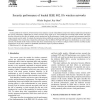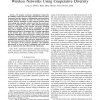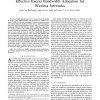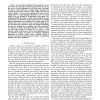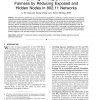COMCOM
2004
13 years 11 months ago
2004
Existing solutions for wireless LAN networks have been subject to security vulnerabilities and previous study has addressed and evaluated the security performance of IEEE 802.11b ...
WINET
2008
13 years 11 months ago
2008
We study how selfish nodes react to transmission costs in wireless networks. Intuitively, it seems that transmission costs should have a stabilizing effect as (rational) nodes will...
TWC
2008
13 years 11 months ago
2008
In this paper, it is shown that it is challenging to evaluate service fairness in multi-hop wireless networks due to intra-flow contention and unequal channel capacity. The convent...
TWC
2008
13 years 11 months ago
2008
We propose cross-layer optimization frameworks for multihop wireless networks using cooperative diversity. These frameworks provide solutions to fundamental relaying problems of de...
TWC
2008
13 years 11 months ago
2008
Abstract-- In distributed wireless networks without centralized control, each user is its own authority to maximize its own performance. This distributed characteristic provides th...
TWC
2008
13 years 11 months ago
2008
Traffic scheduling is key to the provision of quality of service (QoS) differentiation and guarantees in wireless networks. Unlike its wireline counterpart, wireless communications...
JNW
2007
13 years 11 months ago
2007
Abstract— The major trend in next-generation or 4G wireless networks (NGWN/4G) is the coexistence of diverse but complementary architectures and wireless access technologies. In ...
TON
2008
13 years 11 months ago
2008
Abstract-- We consider the problem of broadcasting in an adhoc wireless network, where all nodes of the network are sources that want to transmit information to all other nodes. Ou...
JCM
2007
13 years 11 months ago
2007
— The use of signal processing techniques to protect wireless transmissions is proposed as a way to secure wireless networks at the physical layer. This approach addresses a uniq...
TMC
2008
13 years 11 months ago
2008
Abstract--Two well-known problems that can cause performance degradations in IEEE 802.11 wireless networks are the exposednode (EN) and hidden-node (HN) problems. Although there ha...
